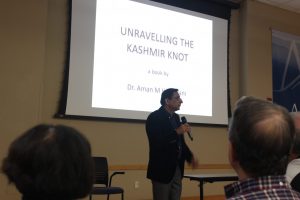Emma Shock
A&F Staff Writer
[email protected]
While waiting for the presentation to begin, eager individuals approach the visiting author with questions regarding the continuing territorial dispute surrounding Kashmir.
Aman Hingorani, a practitioner of law in the Supreme Court of India, led a lecture discussing the conflict between India, Pakistan and now China, concerning the countries’ occupations of the region of Kashmir. His book, Unravelling the Kashmir Knot, traces the origins of the dispute from 1947 to the present and pieces together a solution.
The Western NC chapter of the World Affairs Council presented the discussion on Nov. 16 with the Osher Lifelong Learning Institute at UNC Asheville and the department of political science as part of its lecture series.
Hingorani has been teaching law since 1998 at universities in India and the United Kingdom. He released his book in 2016 and presented it at various institutions internationally, including the University of Cambridge and the University of Oxford.

“Kashmir was always seen as a political issue, so not many lawyers examined it,” Hingorani said. “For me to be able to get into a political issue and segregate the legal aspect of it and examine the legality of India’s and Pakistan’s stands on Kashmir, that was a challenging issue.”
Hingorani said his research on the topic began in 1995 and the book developed after about 20 years. He examined work from British archives and reports from the United Nations to reconstruct what had happened in the dispute, which has lasted 70 years, and piece together a realistic solution.
To move forward in the dispute, Hingorani said, people need to view the Kashmir issue as being composed of legal as well as political elements. Hingorani said law needs to be used to break the political stalemate between India, Pakistan and China by having a court of law determine who has the title to the disputed territory.
“At the end of the day, you have one state occupied by three countries,” Hingorani said. “It has to be an international issue. It’s not about tradition.”
On this trip to the United States to promote the book, Hingorani said he spoke at Harvard and Yale as well as at events in the nation’s capital. He last came to North Carolina in 1993 and this lecture marks his first visit to UNCA.
Monroe Gilmore, a member of the World Affairs Council, said while he saw Hingorani the last time the author visited North Carolina, he first met Hingorani and his family when working in New Delhi with his wife in the 1980s.
“We got to know this was an incredible family,” Gilmore said. “It was like a TV show almost. They would debate at meals, just going at it with each other and that’s why they’re all supreme court warriors.”
George Peery, curator of the World Affairs Council series, said the Asheville chapter and the Charlotte chapter are the only functioning World Affairs Council chapters remaining in North Carolina.
In the wintertime, Peery said the chapter partners with adult education programs in Hendersonville, Brevard and Columbus to allow the speakers coming to Asheville to also hold discussions at satellite locations.
Peery said a guest from the College of Charleston will visit Dec. 5 to talk about the Middle East in the post-ISIS era, and while he is still working on a couple options for April, a speaker will come from George Washington University to discuss the Palestinian and Israeli immigration issue in May.
“We are really lucky that Aman Hingorani was able to come by Asheville and talk to us about an issue that doesn’t make the daily news,” Peery said.



















